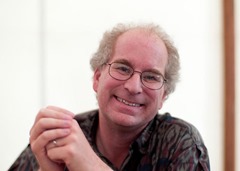Get ePub or Kindle file of this
 Here’s my basic take on the next Librarian of Congress. Most of all, we need someone with “a love of reading—including the e-book variety.”
Here’s my basic take on the next Librarian of Congress. Most of all, we need someone with “a love of reading—including the e-book variety.”
Mastery of tech policy would help as well. Now—one litmus test. What would be the candidates’ preliminary views on the Internet Archive and Google Books vis-à-vis LoC? To what extent, and how, should the Library of Congress rely on them? Should LoC just link in? Or use them or related organizations as contractors to help create LoC-run collections? Or a mix?
I myself would like a mix, so Washington does not control everything—just so the LoC has a copy of every book and other formal collection item. Both independent archives and LoC should preserve and make available “born digital” items, just as the Archives’ Way Back Machine and other activities do now (along with LoC on a smaller scale).
In a related vein, over at Slate, journalist and academic Dan Gillmore says that The Creator of the Internet Archive Should Be the Next Librarian of Congress. I’m a fan of Brewster Kahle (photo) and can easily see him as a contractor or key advisor to the Library of Congress (in fact, he already has provided LoC with lots of valuable pro-bono advice). But a librarian he is not. He is an enabler, an infrastructure person, not a top go-to guru on, say, the topic of highly curated library content. Scanned text from both Archive and the Google could do better on the typo front. A true librarian would have cared more about issues of this kind and the possibility of almost-fully accurate texts of at least some books (yes, I’m talking about true e-books as opposed to mere images of paper books).
For that matter, James Billington, the current librarian on the cusp of retirement, has been out of touch with librarian-related concerns, especially on the public-library side. He was and is Russian history specialist. Sadly, he prefers faxes to e-mail, hardly the sign of a tech-savvy guy (although, in a future post, I’ll tell of one way for Dr. Billington to redeem himself and leave a lasting digital-era legacy).
Given all the literacy issues in this country, might the best choice be not the standard academic but a book-and-Net-oriented librarian with a full understanding of grubby matters such as the Digital Divide? Yet another issue to query candidates about?
Meanwhile, at the New Yorker site, Columbia law professor Timothy Wu is wondering if the Google Books scan project wouldn’t have won more friends if Google had spun it off as a nonprofit from the start, “thereby extinguishing any fears that the company wanted to somehow make a profit from other people’s work.” Excellent question. Similarly Brewster Kahle has been right to raise issues with Google’s fondness on exclusive rights to search its collection of public domain books. Even the Library of Congress, especially LoC, should not be the one-and-only in that respect. In fact, a law should even specify that, lest any ambiguity exist.
Related: Thoughts on the next Librarian of Congress from public librarian Jessamyn West, former LoC staffer Daniel Schuman, Parker Higgins of the Electronic Frontier Foundation, and Siva Vaidhyanathan, a board member of the Digital Public Library of America (to a great extent the DPLA exists because LoC has been so far behind the times). Dan Gilmore compiled the just-supplied list.
Major LoC candidates as reported by Politico, on September 15 (update): Walter Isaacson, head of the Aspen Institute as well as a biographer of Steve Jobs, declined the job when the White House came calling. “Other names still under consideration include University of Pennsylvania President Amy Gutmann; John Palfrey, the head of school at Phillips Academy and the former head of Harvard’s Berkman Center for Internet and Society; former American Library Association President Carla Hayden; Susan Hildreth, former director of the Institute of Museum and Library Services, a federal agency; and Deborah Jacobs, director of the Bill & Melinda Gates Foundation’s Global Libraries Initiative, according to multiple sources. Also in the mix are Archivist of the United States David Ferriero and Brewster Kahle, founder of the Internet Archive.” For my thoughts on Palfrey’s recent book on the library world, go here.
And a reminder from 2009 of the amazing cost-rewards of a national digital library, courtesy Brewster Kahle: “It’s not that expensive. For the cost of 60 miles of highway, we can have a 10 million-book digital library available to a generation that is growing up reading on-screen. Our job is to put the best works of humankind within reach of that generation. Through a simple Web search, a student researching the life of John F. Kennedy should be able to find books from many libraries, and many booksellers—and not be limited to one private library whose titles are available for a fee, controlled by a corporation that can dictate what we are allowed to read.” Oh, what a difference the right Librarian of Congress could make—working with experts like Brewster who have refined their technology over the past six years!
Photo credit: Here.
Similar Posts:
- Ebook and national digital public library panel at ALA Midwinter
- More criticism of e-books as they exist today in the library world
- National Digital Public Library conference: A little progress toward a two-system approach—to help both public and academic libraries?
- TeleRead writer alleges copyright violations at the Internet Archive’s Open Library: Ramifications for major public library group with OL ties?
- Why new Apple e-book format will ‘screw’ America’s libraries: Any chance the DPLA will wake up?